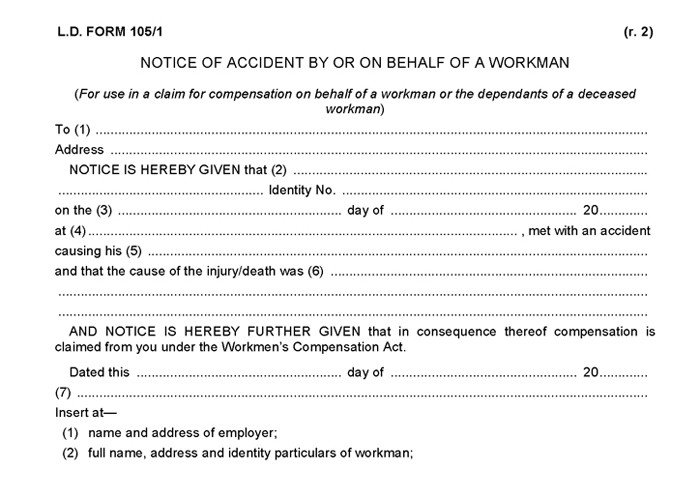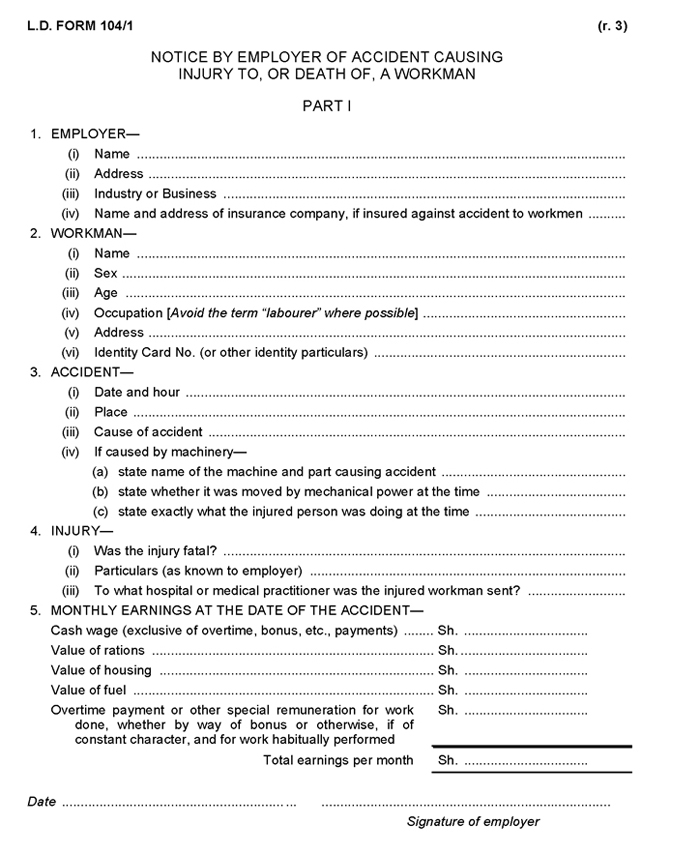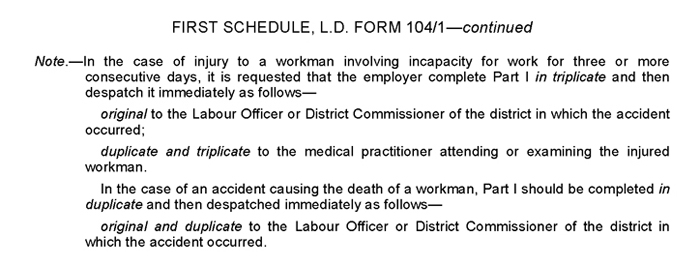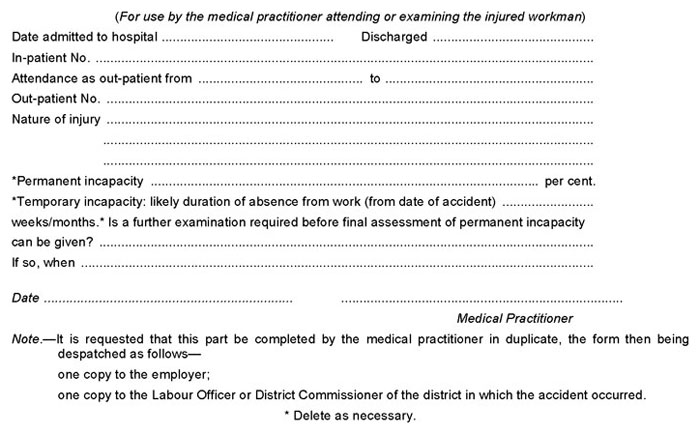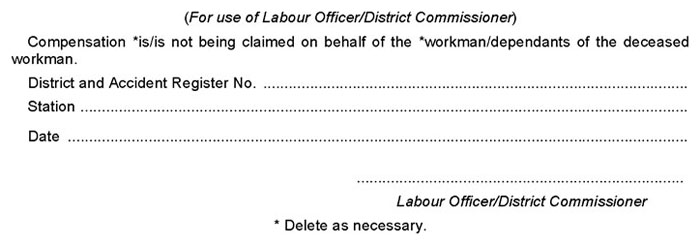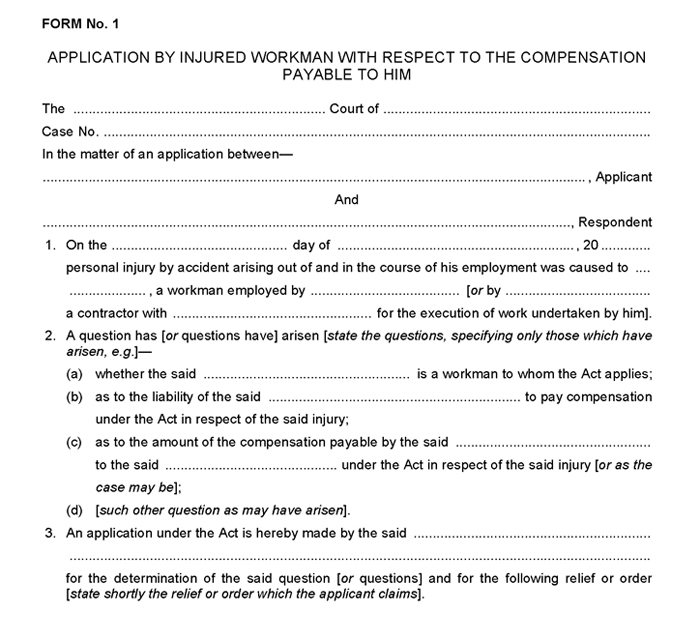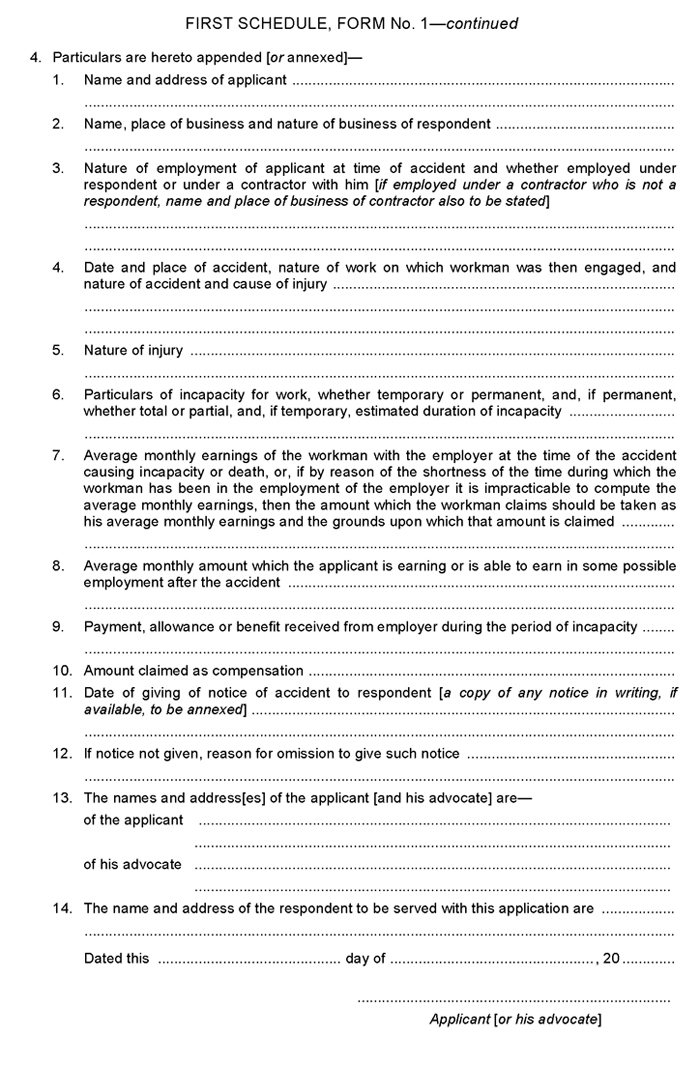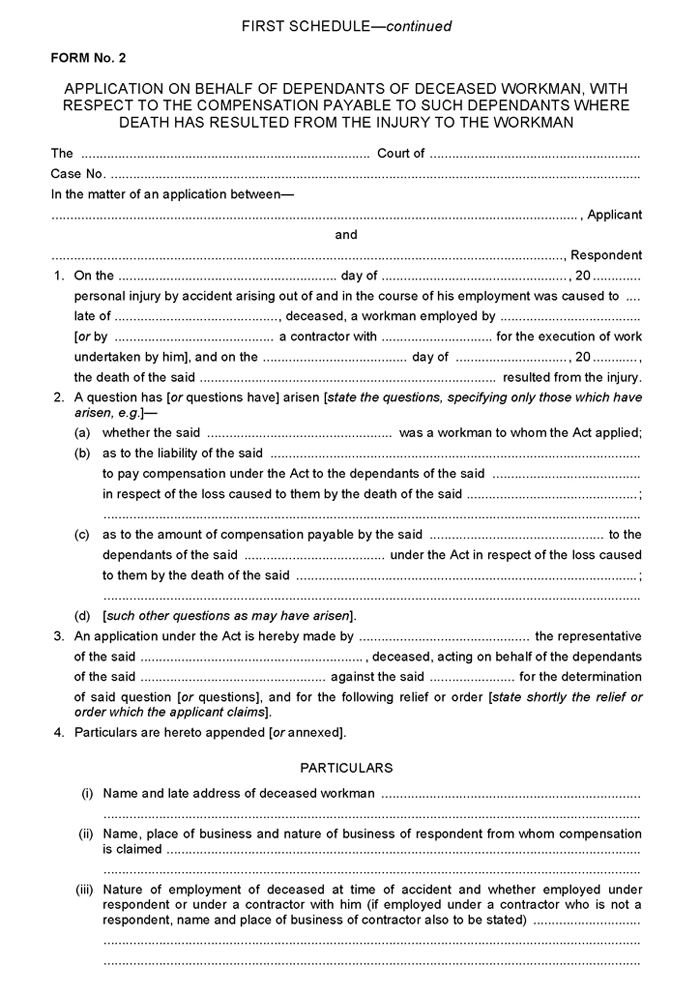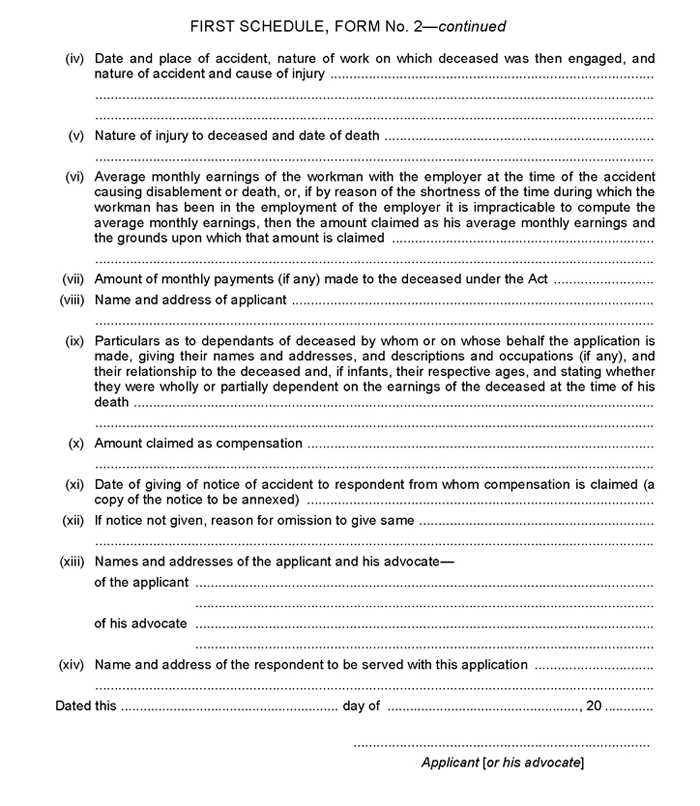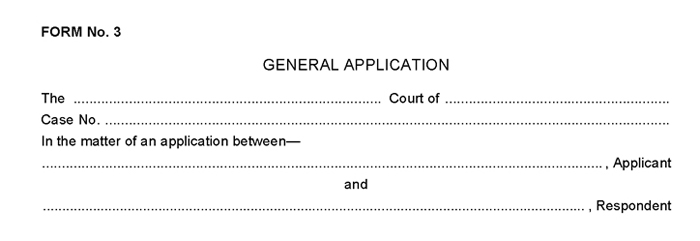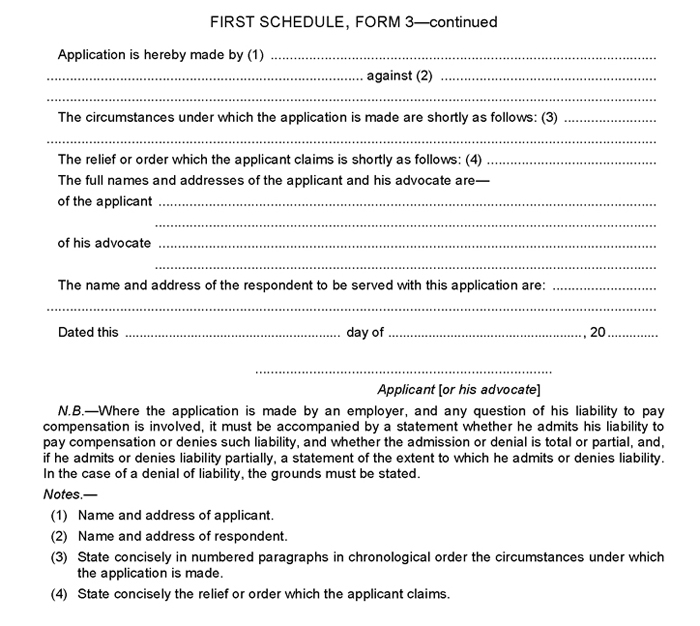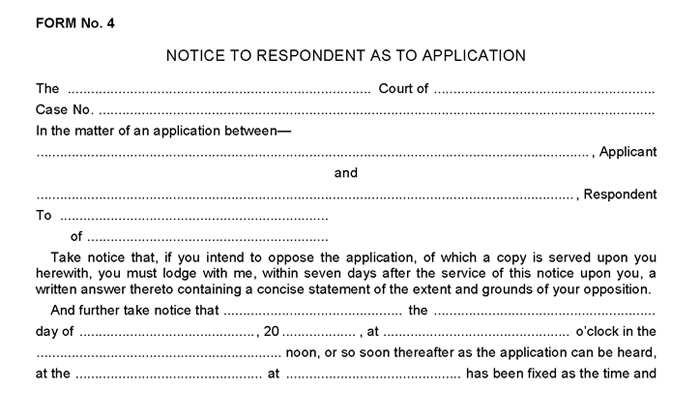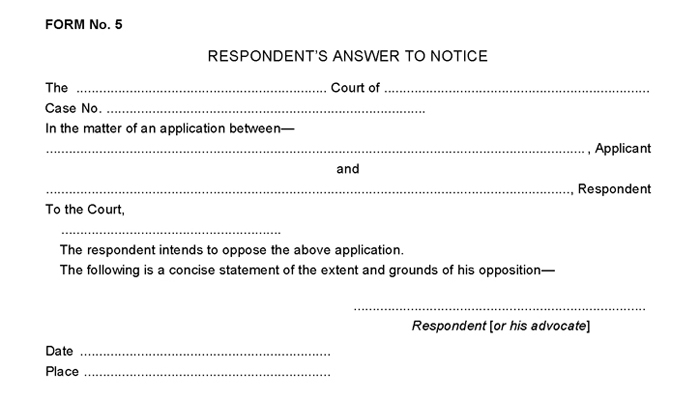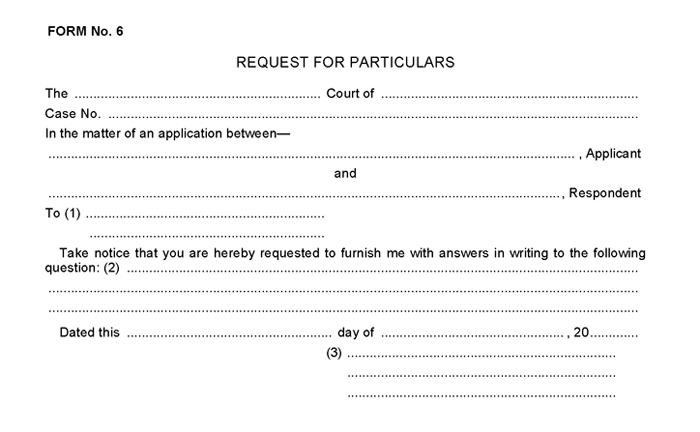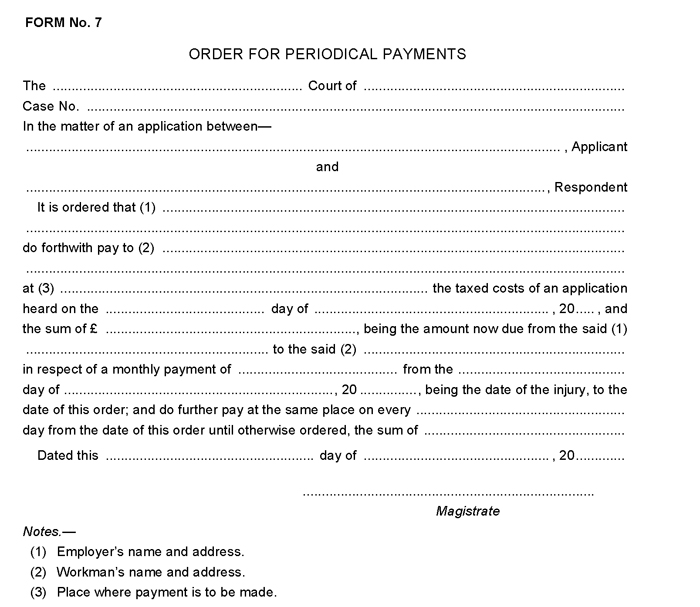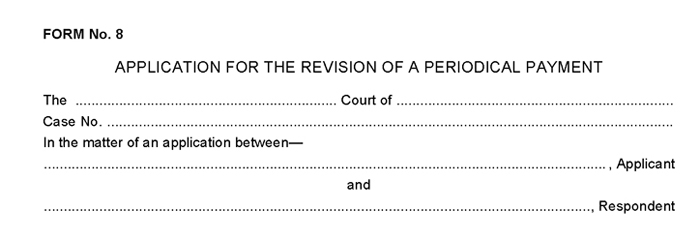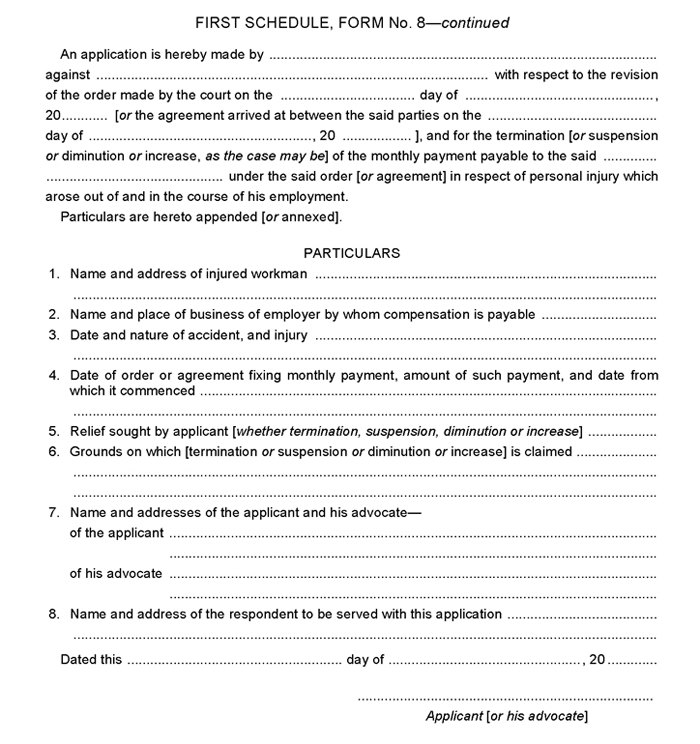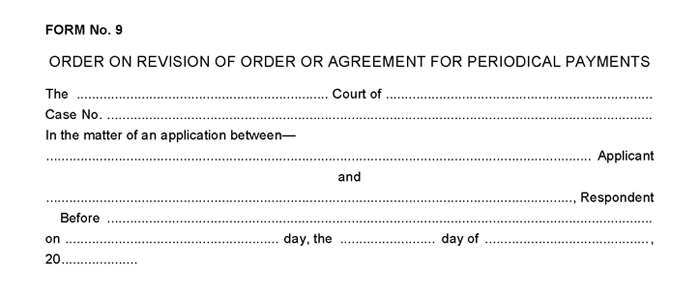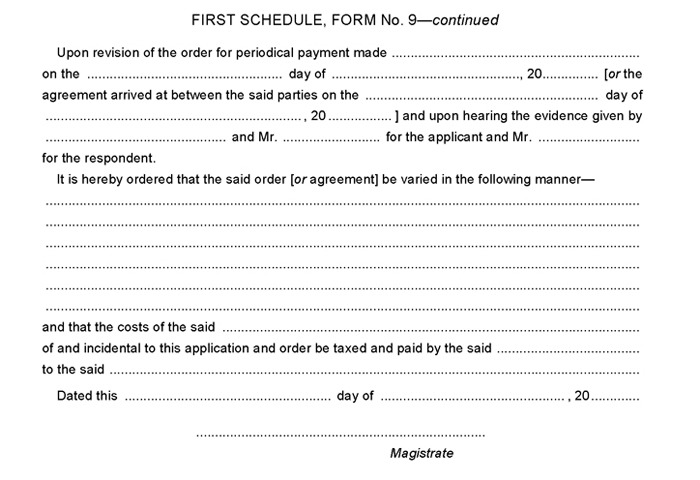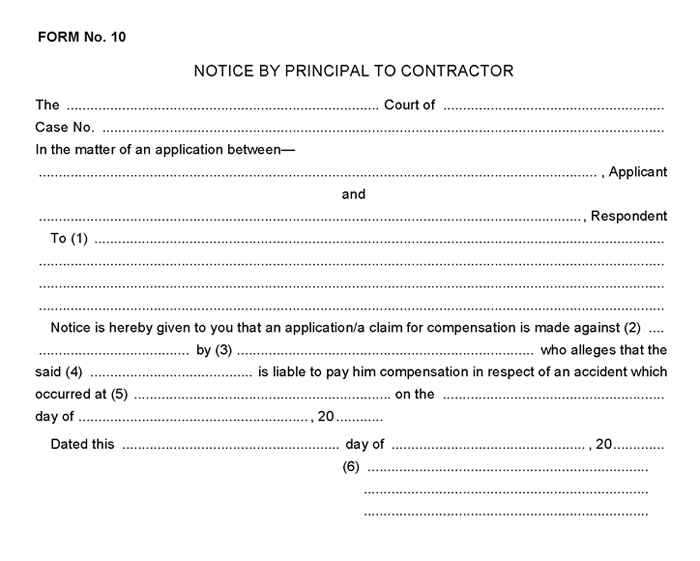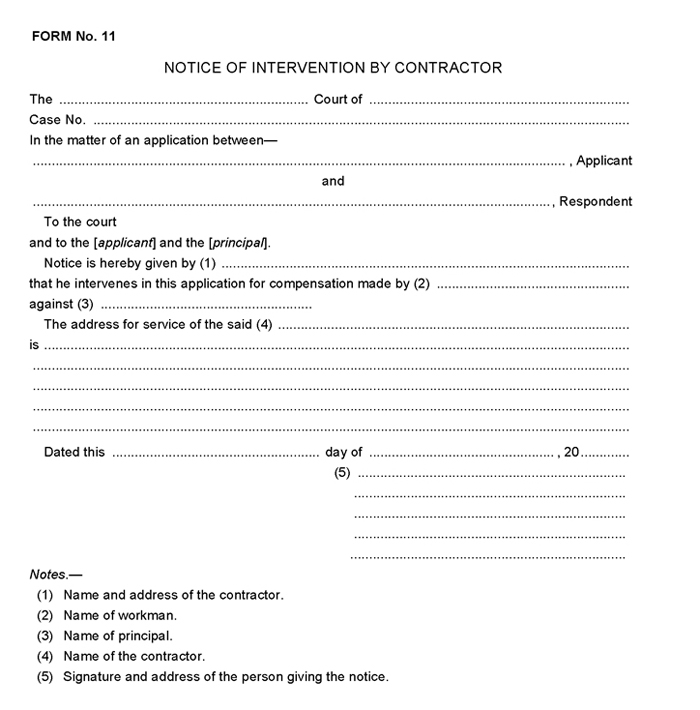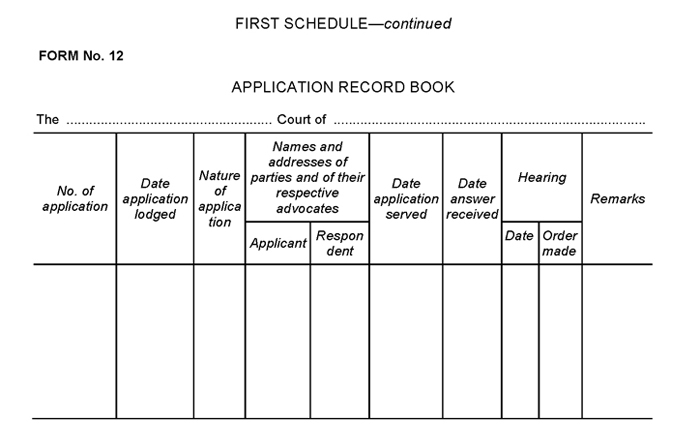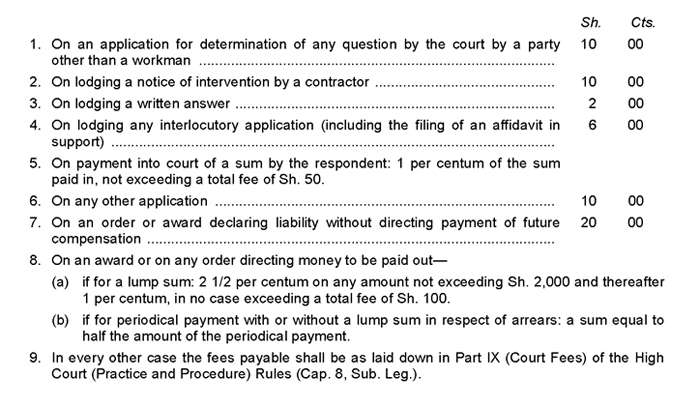|
|
CLASSES OF PERSONS DECLARED NOT TO BE
WORKMEN, UNDER SECTION 2(1), PROVISO (VI) [G.N. 1163/1951, L.N. 179/1956, L.N. 273/1967.]
Any person who was in, or was selected for appointment to, the service of the Government before the 13th June, 1950, or the service of the High Commission before the 31st May, 1950, where, in consequence of injury received by such person in the discharge of his duties, a pension or gratuity which would not be payable if such injury were received otherwise is paid to him, or, in the case of his death, to any of his dependants, under any Act or regulation providing for the grant of any such pension or gratuity.
Any person engaged or employed in any of the following undertakings—
Administration Police Reserve,
Kikuyu Guard and other Home Guards.
OTHER COURTS IN WHICH PROCEEDINGS MAY
BE BROUGHT, UNDER SECTION 3(1) (PROVISO TO THE DEFINITION OF “COURT”) [L.N. 236/1964.]
In the North-Eastern Province, and the Marsabit, Isiolo, Tana River, Samburu and Turkana Districts proceedings under the Act may be brought in a subordinate court of the second class.
WORKMEN’S COMPENSATION (COMPULSORY INSURANCE) ORDER
ARRANGEMENT OF ORDERS
Orders under section 26
WORKMEN’S COMPENSATION (COMPULSORY INSURANCE) ORDER [L.N. 213/1974, L.N. 223/1976.]
| 1. |
Citation
This Order may be cited as the Workmen’s Compensation (Compulsory Insurance) Order.
|
| 2. |
Application
This Order shall apply to any employer in any undertaking or part of any undertaking which consists in the carrying on, for gain or reward, of one or more of the following activities, that is to say—
| (a) |
the construction, structural alteration, maintenance or repair of any building, the demolition of any building and the preparation for, and laying the foundation of, any intended building;
|
| (b) |
the construction of any railway line or siding, and the construction, structural alteration or repair or the demolition of any airfield, dock, harbour, wharf, quay, pier, in-land navigation works, road tunnel, bridge, viaduct, waterworks, dam, reservoir, pipeline, aqueduct, sewer, sewage works or latticework structure designed solely for the support of electric lines;
|
| (c) |
the carriage of passengers and goods, or either of them, by any motor vehicle whether or not required to be licensed as a public service vehicle under the Traffic Act (Cap. 403) or a road service licence, or public carriers licence or a limited carriers licence, under the Transport Licensing Act (Cap. 404):
Provided that this Order shall not apply to—
| (i) |
the Government of Kenya; |
| (ii) |
any employer who provides and maintains in force a security consisting of an undertaking by a surety, approved by the Minister, to make good, subject to any conditions specified in such undertaking and up to an amount approved by the Minister, any failure by the employer to discharge any liability which he may incur under the Act to any workmen employed by him. |
|
|
| 3. |
Employers to insure
Every employer to whom this Order applies shall insure and keep himself insured with an insurer carrying on business in Kenya as an insurance company, in respect of any liability which he may incur, under the Act, to each workman employed by him either exclusively or in part in any undertaking or in part of any under-taking referred to in paragraph 2.
|
Regulations under section 42
WORKMEN’S COMPENSATION REGULATIONS [G.N. 1893/1953, L.N. 63/1956, L/N. 385/1962.]
| 1. |
These Regulations may be cited as the Workmen’s Compensation Regulations.
|
| 2. |
The notice of an accident required by section 13 of the Act to be given by or on behalf of a workman shall be in the form L.D. Form 105/1 set out in the First Schedule.
|
| 3. |
The notice of an accident causing injury to a workman required by section 14 of the Act to be given by an employer shall be in the form L.D. Form 104/1 set out in the First Schedule.
|
| 4. |
The prescribed amount for the purposes of paragraph (a) of proviso (ii) to section 13 of the Act, and for the purposes of sub-section (1) of section 29 of the Act, shall be six hundred shillings per month.
|
| 5. |
The fees and charges payable for the forms of medical aid described in the second column of the Second Schedule to workmen in Kenya shall be the fees and charges specified in relation to such aid in the third column of that Schedule:
Provided that, where in the case of any form of such aid a fee or charge is described in that Schedule as a maximum fee or charge, such fee or charge only as is reasonable in the circumstances of the case shall be payable, not exceeding the specified fee or charge.
|
SECOND SCHEDULE [Rule 5.]
SCALE OF FEES AND CHARGES FOR MEDICAL AID
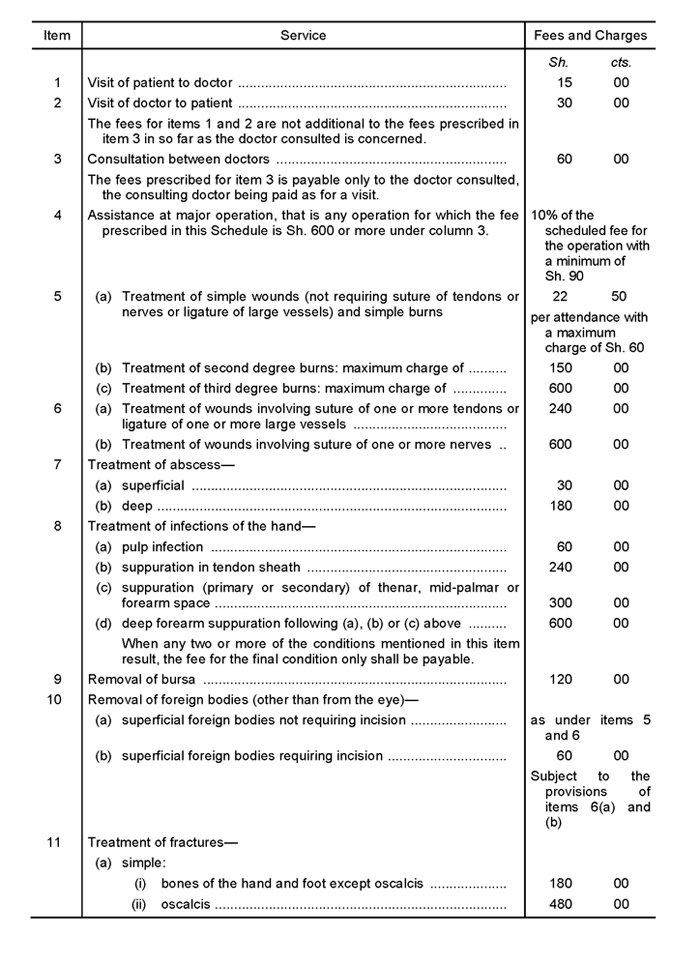
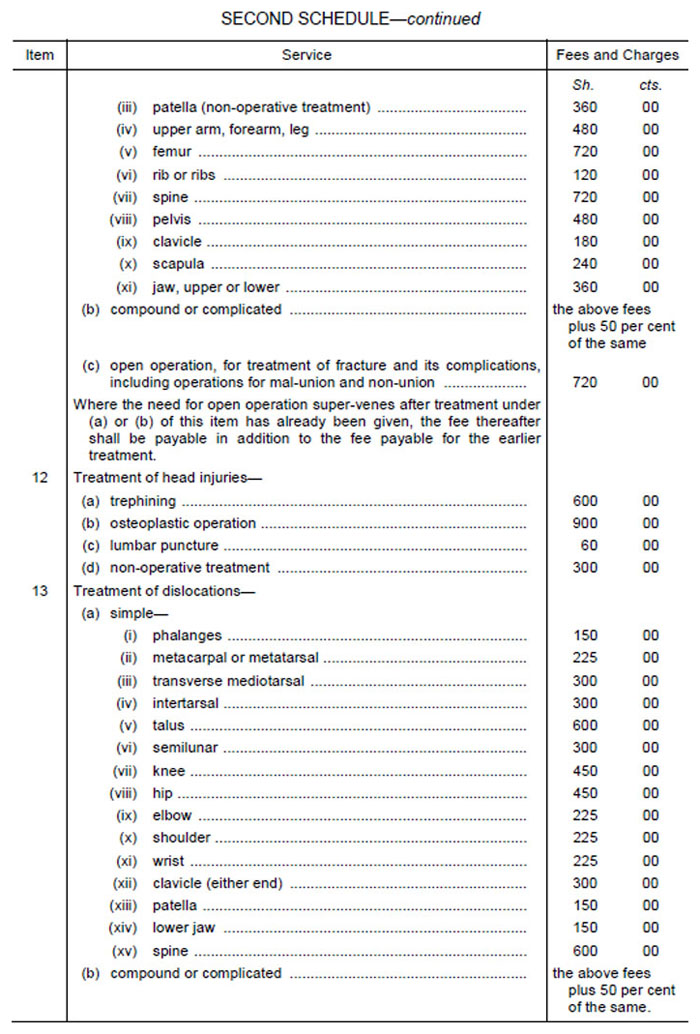
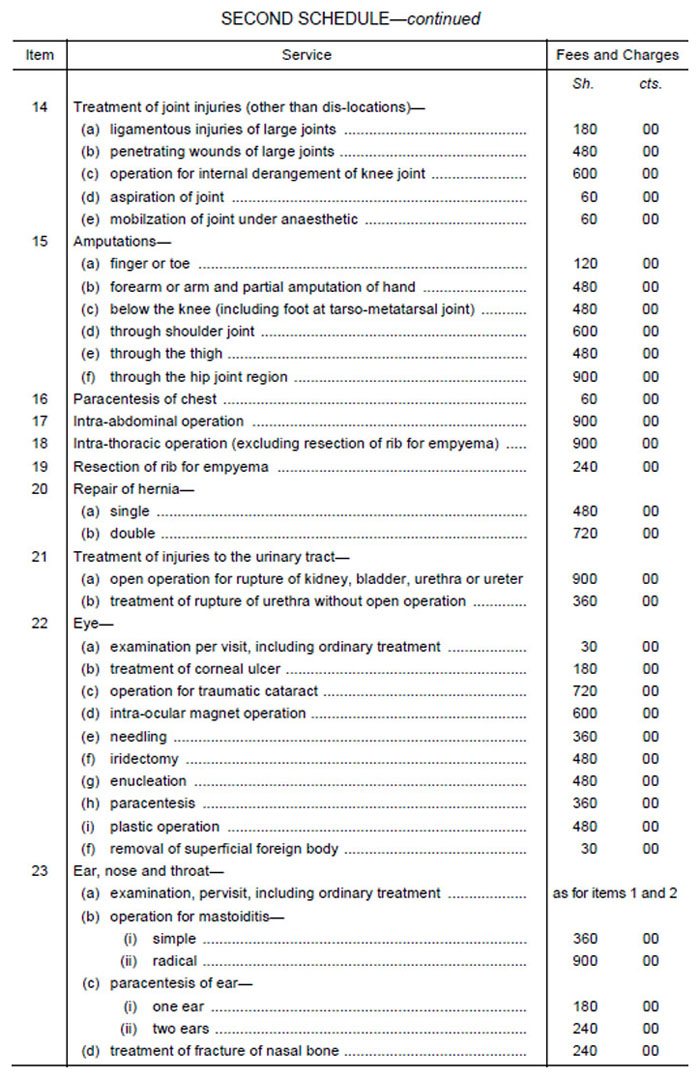
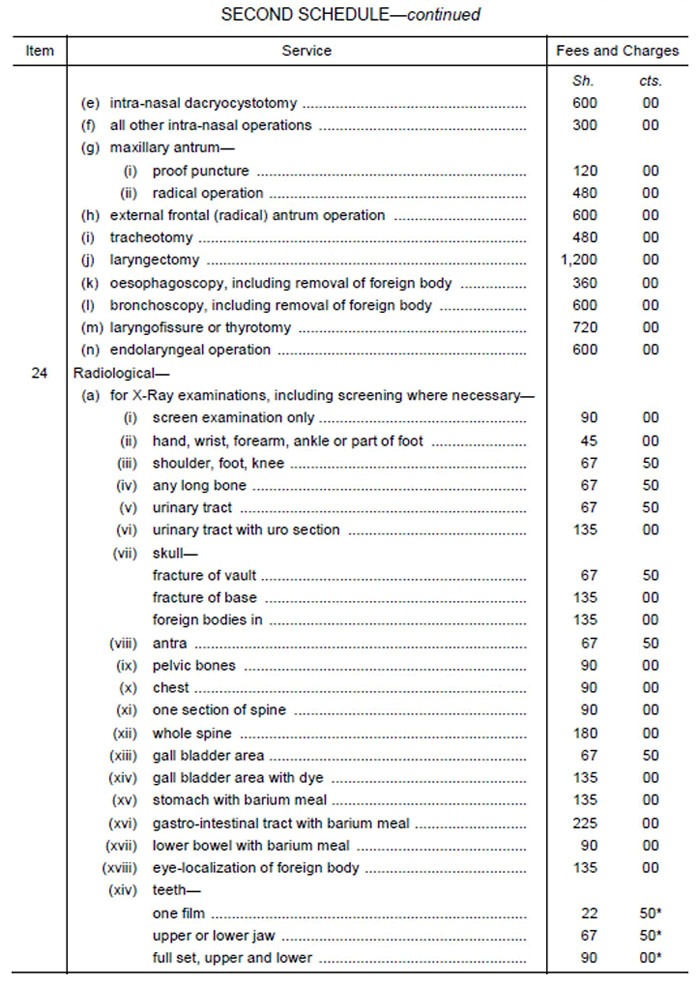
______________________* Medical practitioner
or dentist
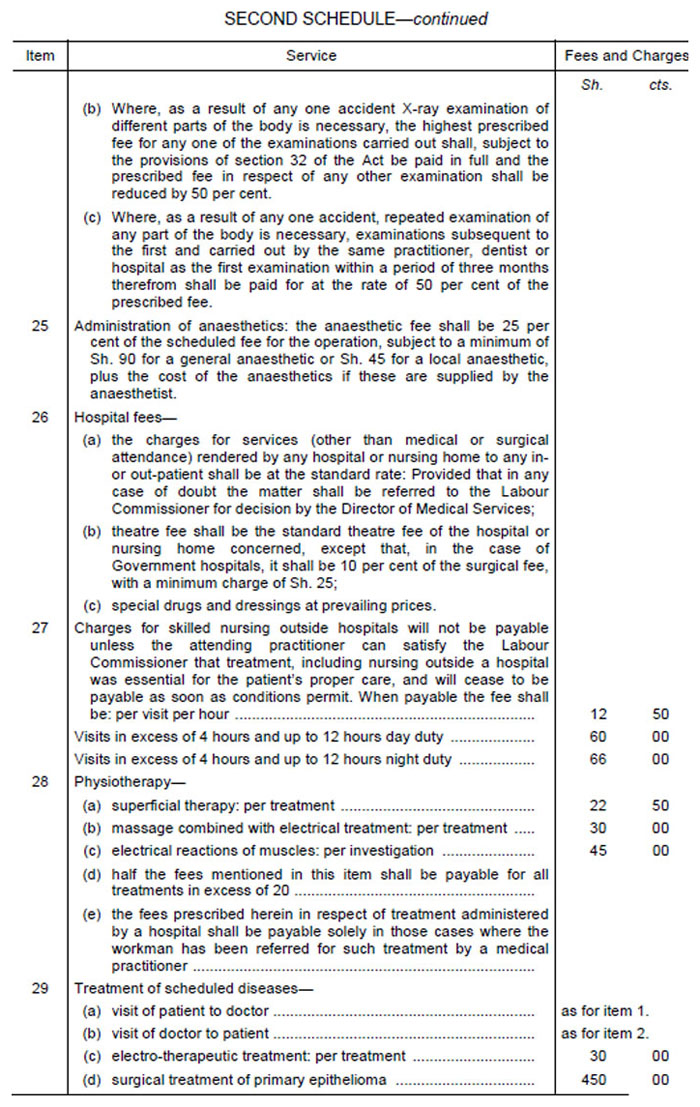
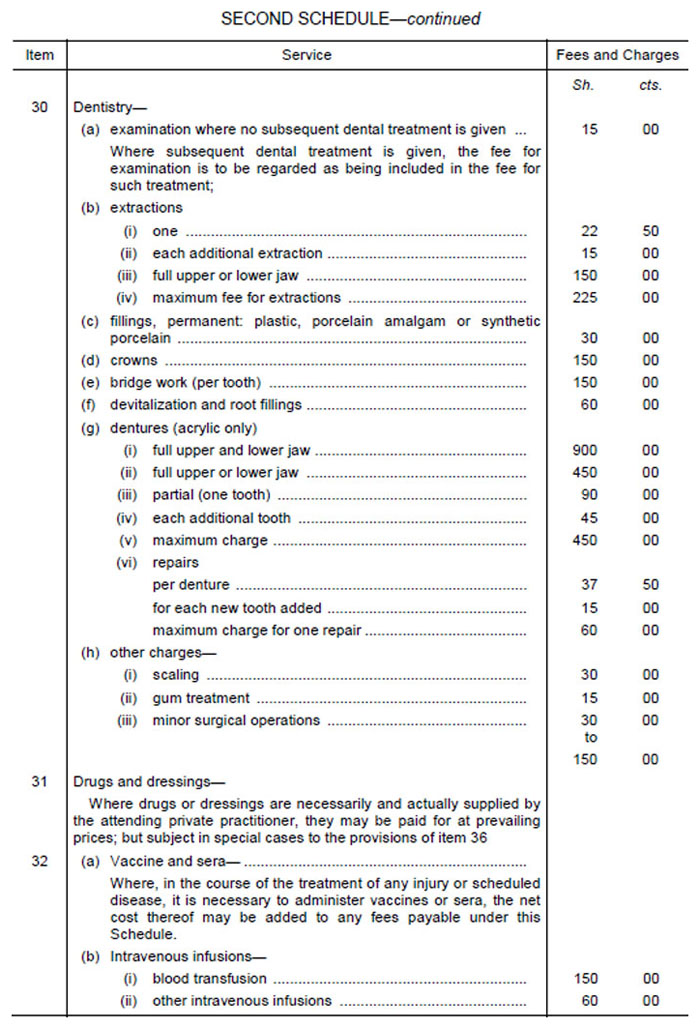
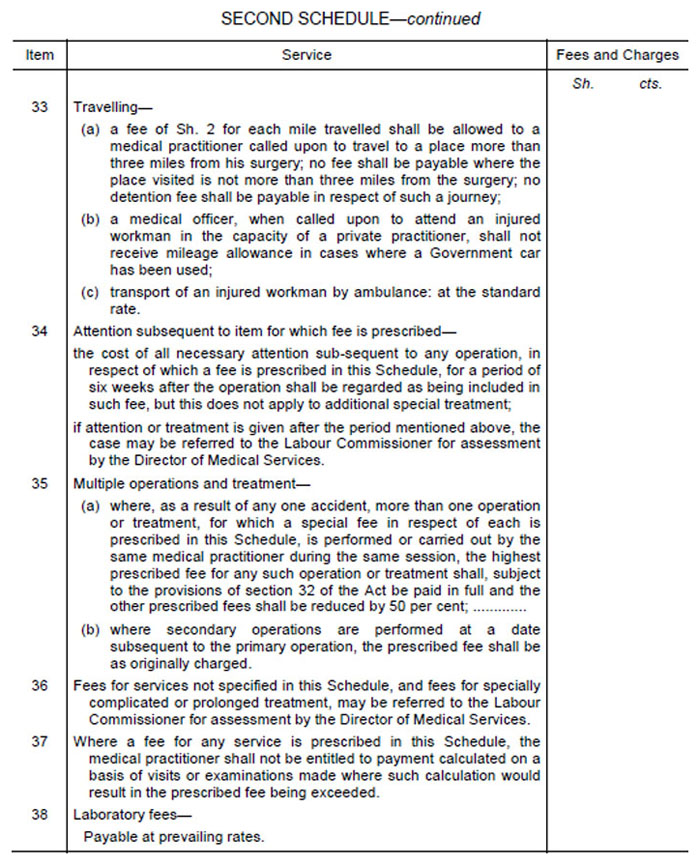
Rules of Court under section 43
WORKMEN’S COMPENSATION RULES
[G.N. 1139/1950, L.N. 538/1958.]
| 1. |
These Rules may be cited as the Workmen’s Compensation Rules.
|
| 2. |
The forms contained in the First Schedule shall, where applicable, be used in matters or proceedings under the Act, with such variations and modifications as the circumstances may require.
|
| 3. |
The court shall, upon request—
| (a) |
give information as to matters of form or procedure to any party to any proceedings under the Act, and supply to any such party who is not legally represented any form required by these Rules for use in matters or proceedings before a court;
|
| (b) |
fill in and make copies of any necessary forms whenever a party who is not legally represented is unable to do so owing to illiteracy, blindness or other physical cause;
|
| (c) |
issue all necessary process.
|
|
| 4. |
The first document lodged by a party with the court shall bear such party’s full name and such address as will enable service of notices and documents to be effected on him either by delivery or through the post; a post office box alone shall not be a sufficient address for the purposes of this Rule.
|
| 5. |
The court shall mark with a separate number the first document lodged with the court by an applicant, and any document lodged subsequently by any party in relation to that application shall first be marked with the same number by the party lodging it and, unless so marked, may be refused by the court.
|
| 6. |
The court shall file under their respective numbers and keep separate the records of all applications made under the Act.
|
| 7. |
The court shall keep a book, to be called the Application Record Book, which shall be in Form No. 12 in the First Schedule.
|
| 8. |
The court shall, within two weeks after the end of March, June, September and December in each year, furnish to the Labour Commissioner a return of all determinations made by the court during the preceding three months, and shall state in such return the nature of each application, the names of the applicant and the respondent and the order made.
|
| 9. |
Any minute of any order or appointment made by the court and any receipt to be given by the court may be signed by the magistrate.
|
| 10. |
Any change of such address shall forthwith be notified, by the party making such change, to the court and to the other party or parties to the proceedings.
|
| 11. |
Any address lodged by a party in pursuance of rule 4 shall remain an address for service of such party from the date of lodging such address until forty-eight hours after change thereof has been notified as prescribed in rule 10.
|
| 12. |
Save as is otherwise specially provided in the Act or these Rules, the following provisions shall apply to service of applications, answers, orders, notices and other documents which, by the Act or any rules made thereunder, are required to be served on any person who resides in Kenya, or who has an address for service in Kenya, or who has authorized a person resident in Kenya to accept service on his behalf—
| (a) |
service may be effected by sending a copy thereof by prepaid registered post to the party to be served at his address for service; every copy so sent shall,
until the contrary is proved or unless and until the copy is returned by the postal authorities, be deemed to have been served on the person to whom it was so addressed at the time at which it would be delivered in the ordinary course of post;
|
| (b) |
where a party to an application employs an advocate for the purposes of the application, service upon that party may be effected by delivery of the document at the office of such advocate;
|
| (c) |
service may also be effected through any messenger of the court in the manner provided by the rules governing service of summons in civil cases;
|
| (d) |
service may be effected in any other matter, provided that a receipt, stating the date and hour of service signed by the person to be served or by a person entitled to give such receipt on his behalf, is endorsed on the document or on a copy, thereof.
|
|
| 13. |
Where any respondent to an application either does not come within the provisions of rule 12 or cannot be served in any of the manners provided in that rule, the court may, upon application ex parte supported by an affidavit stating the circumstances, direct in what manner service shall be effected upon him, including service by newspaper advertisement; and service in accordance with such directions shall be valid and effectual.
|
| 14. |
Save where other provision is made, service shall be effected by the parties or, at the instance of the parties, by the court.
|
| 15. |
(1) A workman or an employer who desires the determination of any question arising out of an accident in which compensation is or might be claimed shall lodge with the court a written application in the prescribed form accompanied by particulars containing—
| (a) |
a concise statement of the circumstances under which the application is made and the relief or order which the applicant claims, or the question which he desires to have determined;
|
| (b) |
the full name and address of the applicant, and the name and address of the respondent.
|
| (2) |
If the application is made by an employer, it shall be accompanied by a statement whether he admits his liability to pay compensation or denies such liability, and whether the admission or denial is total or partial, and if he admits or denies liability partially a statement of the extent to which he admits or denies liability; in the case of a denial of liability, the grounds shall be stated.
|
|
| 16. |
(1) As soon as an application, together with the accompanying particulars and statements prescribed by these Rules, has been lodged, the court shall cause a copy thereof to be served upon the respondent in the manner prescribed, together with a notice informing the respondent that he must lodge with the court such an answer as is prescribed by paragraph (2), within the period therein prescribed, and that in default of his complying with such notice or in default of his appearing at a time and place fixed in the notice such order may be made as the court deems just and expedient; and, save with the written consent of the respondent communicated to the court, not less than fourteen clear days shall elapse between the date of the service of the notice upon the respondent and the date fixed for hearing the application.
| (2) |
If the respondent intends to oppose an application he shall, within seven days after service of the notice, or within such extended period as the court may upon special request allow, lodge with the court a written answer containing a concise statement of the extent and grounds of his opposition.
|
| (3) |
The court may, at any time before the determination of the question in dispute and upon such terms as to adjournment or as to costs as may be deemed just, allow an application, or any particulars or statement accompanying the same, or any answer thereto, to be amended; and any such amendment shall be lodged with the court, who shall forthwith cause it to be served upon the opposite party in manner prescribed.
|
|
| 17. |
(1) The respondent may, not later than seven days after he has received notice of application, serve upon the applicant a request in writing for further particulars of the grounds upon which the application is made, specifying in such request the questions as the which he desires to have information; and the applicant may, not later than seven days after he has received the answer to the application, serve on the respondent a request in writing for similar particulars of the grounds upon which the application is opposed.
| (2) |
A copy of any such request shall forthwith be lodged with the court by the party making the request, and a copy of any reply thereto shall forthwith be lodged with the court by the party make the reply.
|
| (3) |
If the party so requested to furnish particulars fails to do so within seven days from the date of service of the request aforesaid and in consequence of such failure it is necessary to adjourn the hearing of the application, the court may order that the costs occasioned by such adjournment shall be paid by the party so in default.
|
| (4) |
The court may disallow, with costs, any request for particulars which appears to the court to be unnecessary or vexatious.
|
| (5) |
The court may award against the party making a request for particulars the costs of the replies thereto.
|
|
| 18. |
Where an applicant wishes to amend his application or any particulars or statement accompanying it, or where a respondent wishes to amend his answer to an application, the party wishing to make such amendment shall forthwith lodge with the court a statement in writing of such amendment, and shall at the same time serve a copy thereof upon the other party or parties to the proceedings.
|
| 19. |
(1) A respondent from whom compensation is claimed may pay into court a sum which is considered by him to be sufficient to cover his liability.
| (2) |
If no greater compensation be awarded than the sum of money which the respondent has paid into court, the court may order that any costs incurred by such respondent, after payment by him into court of the said sum of money, shall be paid by the applicant.
|
|
| 20. |
Every party shall lodge with the court such copies of documents as are required to be served, by the court, on the other party to the application or to be sent to him.
|
| 21. |
(1) Where a principal has given notice to a contractor of claim or application for compensation made against the principal, and the contractor desires to intervene, he shall forthwith lodge with the court a notice that he so intervenes and shall forthwith serve copies of such notice of intervention upon the applicant and the principle the contractor shall thereupon be entitled to make copies of the application and of any other document then lodged with the court in connexion with the application.
| (2) |
A contractor who has so lodged with the court notice that he intervenes shall lodge an answer to the application within seven days after service upon him of the said notice given by the principal, or within such further time as the court may on application allow.
|
| (3) |
The court may, on the hearing of the application, either order that such person be made a respondent if the court is satisfied that he, is entitled so to intervene, or may refuse to make him a respondent and order him to pay the costs incurred by his intervention if satisfied that he is not entitled so to intervene.
|
|
| 22. |
If any person served with a notice as a contractor desires to dispute the applicant’s claim or his own liability to the principal, he shall appear before the court; and in default of his so doing he shall be deemed to admit the validity of any order made against the principal, whether such order is made by consent or otherwise, and his own liability to indemnify the principal to the extent claimed in the notice served on him by the principal.
|
| 23. |
The court may, at any stage of the proceedings, upon request made to it in writing or of its own motion, order that any person appearing to be interested be joined in the proceedings.
|
| 24. |
(1) An application to determine what sum is payable in respect of medical attendance on or the burial of a deceased workman who leaves no dependants shall be made by the personal representative, if any, of the deceased workman, or, if there is no such personal representative, or he fails to make such application, by any person to whom any such expenses are due; and in the latter case any other person known to the applicant to be a person to whom any such expenses are due shall be joined in the application either as applicant or as respondent.
| (2) |
Where the amount awarded by the court on any such application is insufficient to pay such expenses in full, it shall be apportioned between the persons to whom such expenses are payable in such manner as the court shall direct.
|
|
| 25. |
(1) When a court submits any question of law for the decision of a judge of the High Court, the case shall be divided into paragraphs numbered consecutively, and shall state concisely such facts and refer to such documents as may be necessary to enable the judge to decide the questions of law raised thereby.
| (2) |
The case shall be signed and sent to the Registrar of the High Court, who shall forthwith transmit the same to a judge, who shall appoint a day, hour and place for hearing the case.
|
| (3) |
The Registrar shall forthwith cause due notice of the day, hour and place appointed for hearing the case to be given to the parties; and such notice shall be not less than fourteen clear days before the date of the hearing, unless the judge, with the consent of all parties, fixes an earlier day.
|
| (4) |
Any party shall be entitled, on payment of the prescribed fees, to obtain from the Registrar a copy of the case.
|
| (5) |
After deciding the question submitted to him, the judge shall remit the case with a memorandum of his decision to the court.
|
| (6) |
The judge may remit the case to the court for re-statement or further statement.
|
| (7) |
The costs of the hearing of a case shall be in the discretion of the court, and shall form part of the proceedings before the court.
|
|
| 26. |
The fees payable in respect of proceedings under these Rules shall be those set out in the Second Schedule:
Provided that no fees shall be payable under this Rule by any workman or by the dependants of any workman.
|
| 27. |
Appeals under section 22 of the Act shall be made in accordance with the rules relating to appeals from magistrates in civil matters and the fees chargeable shall be the same:
Provided that no fees shall be payable under this Rule by any workman or by the dependants of a deceased workman.
|
| 28. |
Where any matter or thing is not specially provided for under these Rules, the same procedure shall be followed and the same provisions shall apply, as far as practicable, as in a similar matter or thing under the Civil Procedure Act (Cap. 21) and the rules made thereunder:
Provided that the magistrate may at any time direct that an infant shall appear as an applicant or respondent in the same manner as it he were of full age.
|
| 29. |
Costs shall be paid in respect of proceedings under these Rules according to Part III of the Remuneration of Advocates Order (Cap. 16. Sub. Leg.).
|
| 30. |
Notwithstanding anything contained in these Rules, no costs shall be paid by a workman in any proceedings in which such workman’s monthly earnings do not exceed two hundred shillings:
Provided that the court may, if in its opinion any application made by a workman is frivolous or vexatious, award costs against such workman.
|
SECOND SCHEDULE [Rule 26.]
|



